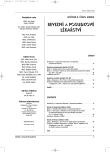-
Medical journals
- Career
Autoimmune diseases in Assessment Medicine
Authors: R. Slavíčková
Authors‘ workplace: Společnost posudkového lékařství ČLS JEP Praha
Published in: Reviz. posud. Lék., 8, 2005, č. 4, s. 73-81
Overview
Autoimmune diseases are characterized by the process which is iniatiated and maintained by an inappropriate immunological reaction of the organism leading to the lesion of tissues or organs or the disorder of their function. Autoantibodies or autoreactive T lymphocytes cause the damage of cells or tissues. Up-to-date, there is no uniform point of view to the taxonomy of autoimmune diseases but they are usually divided according to the extent of the lesion to system ones (organ nonspecific) which affect more organs and to localized ones (organ specific) which affect usually one organ. Predominantly autoimmune diseases are currently the frequent cause of disability. Generally, autoimmune diseases form a very extensive group, therefore only a simplified review of autoimmune diseases and their assessment from the point of view of Review Medicine is presented in this article. The most frequent system autoimmune diseases are accompanied with the brief description of diagnostics, functional assessment and treatment possibilities.
Key words:
autoantibodies – organ nonspecific autoimmune diseases – organ specific autoimmune diseases
Labels
Medical assessment Occupational medicine
Article was published inMedical Revision

2005 Issue 4
Most read in this issue
Login#ADS_BOTTOM_SCRIPTS#Forgotten passwordEnter the email address that you registered with. We will send you instructions on how to set a new password.
- Career

